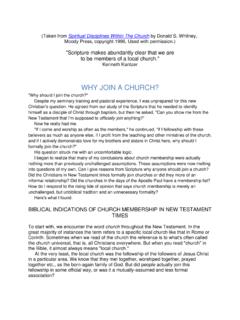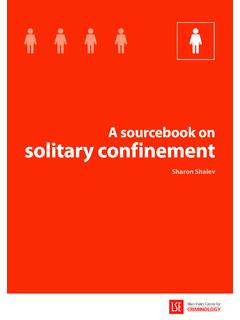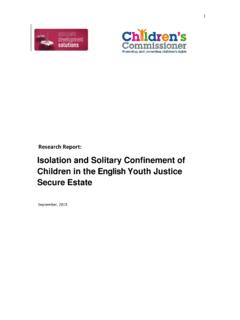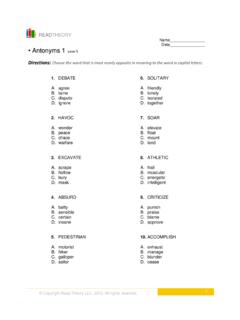Transcription of Silence and Solitude . . . For The Purpose Of Godliness
1 This is chapter 10 in Spiritual Disciplines for the Christian Life (NavPress, 1991). Silence and Solitude .. & quot ;For The Purpose Of Godliness & quot ; My favorite short story is The Bet by Anton Chekhov, a Russian writer of the last half of the nineteenth century. The plot involves a wager between two educated men regarding solitary confinement. A wealthy, middle-aged banker believed that the death penalty was a more humane penalty than solitary confinement because, & quot ;An executioner kills at once, solitary confinement kills gradually.& quot ; One of his guests at a party, a young lawyer of twenty-five disagreed, saying, & quot ;To live under any conditions is better than not to live at all.& quot ; Angered, the banker impulsively responded with a bet of two million rubles that the younger man could not last five years in solitary confinement. The lawyer was so convinced of his endurance that he announced he would stay fifteen years alone instead of only five.
2 The arrangements were made and the young man moved into a separate building on the grounds of the banker's large estate. He was allowed no visitors or newspapers. He could write letters but receive none. There were guards watching to make sure he never violated the agreement, but they were placed so that he could never see another human being from his windows. He received his food in Silence through a small opening where he could not see those who served him. Everything else he wanted books, certain foods, musical instruments, etc. was granted by special written request. The story develops with a description of the things the lawyer asked for through the years and the observations of the guards who occasionally stole a glance through a window. During the first year the piano could be heard at almost any hour and he asked for many books, mostly novels and other light reading. The next year the music ceased and the works of various classical authors were requested.
3 In the sixth year of his isolation he began to study languages and soon had mastered six. After the tenth year of his confinement, the prisoner sat motionless at the table and read the New Testament. After more than a year's saturation of the Bible he began to study the history of religion and works on theology. During the last two years his reading broadened to cover many subjects in addition to theology. The second half of the story focuses on the night before the noon deadline when the lawyer will win the bet. The banker is now at the end of his career. His risky speculations and impetuosity had gradually undermined his business. The once self-confident millionaire was now a second-rate banker and to pay off the wager would destroy him. Angry at his foolishness and jealous of the soon-to-be-wealthy man who was now only forty, the old banker determines to kill his opponent and frame the guard with the murder.
4 Slipping into the man's room he finds him asleep at the table and notices a letter the lawyer has written to him. He picked it up and read the following: Tomorrow at twelve o'clock I shall be free, .. but before leaving this room, .. I find it necessary to say a few words to you. With a clear conscience, and before God, who sees me, I declare to you that I despise freedom and life and health and all that your books call the joys of this world. For fifteen years I have studied attentively the life of this world. It is true that I neither saw the earth nor its peoples, but in your books I lived.. I sang songs, I hunted the deer and the wild boar in the forests.. In your books I climbed to the summit of Elburz and Mont Blanc, and I saw from those heights the sun rise in the morning, and at night it shed its purple glow over the sky and the ocean and the mountain-tops. I saw beneath me the flashing lightning cut through the clouds.
5 I saw green fields, forests, rivers, lakes and towns. I heard the song of the sirens and the music of the shepherd's reed-pipes. I felt the touch of the wings of beautiful [angels] who had flown to me to talk about God.. Your books gave me wisdom. All that had been achieved by the untiring brain of man during long centuries is stored in my brain in a small compressed mass.. I know I am wiser than you all.. And I despise all your books, I despise all earthly blessings and wisdom. All is worthless and false, hollow and deceiving like the mirage. You may be proud, wise and beautiful, but death will wipe you away from the face of the earth, as it does the mice that live beneath your floor; and your heirs. your history, your immortal geniuses will freeze or burn with the destruction of the earth. You have gone mad and are not following the right path. You take falsehood for truth, and deformity for beauty.
6 To prove to you how I despise all that you value I renounce the two millions on which I looked, at one time, as the opening of paradise for me, and which I now scorn. To deprive myself of the right to receive them, I will leave my prison five hours before the appointed time, and by so doing break the terms of our compact. The banker read these lines, replaced the paper on the table, kissed the strange, sleeping man and with tears in his eyes quietly left the house. Chekhov writes, & quot ;Never before, not even after sustaining serious losses on change, had he despised himself as he did at that moment.& quot ; His tears kept him awake the rest of the night. And at seven the next morning he was informed by the watchman that they had seen the man crawl through a window, go to the gate, and then I don't recommend that we separate ourselves in this way, and I don't affirm all the lawyer's conclusions, but I do believe Chekhov looks into a room where every Christian sometimes dreams of living.
7 There is something both appealing and transforming about Silence and Solitude . Other than Jesus Christ, perhaps the greatest men under each Covenant Moses and Paul were both transformed through years in virtual isolation in a remote wilderness. And there are moments in our pressure-cooker days when years of escape to some hidden place sounds wistfully compelling to the Christian spirit. When we think with balance we realize that it would be neither right nor desirable to be cloistered from our God-given responsibilities involving other people. Biblical reality calls us to family, fellowship, evangelism, and ministry for the sake of Christ and His kingdom. And yet through the Holy Spirit, & quot ;deep calls to deep& quot ; (Psalm 42:7) in such a way that there is a part of our spirit that craves Silence and Solitude . Just as we must engage with others for some of the Disciplines of the Christian life, so there are times when we must temporarily withdraw into the Disciplines of Silence and Solitude .
8 In this chapter we will explore what these twin Disciplines are, find Biblical reasons for practicing them, and conclude with some sensible suggestions for starting. EXPLANATION OF Silence AND Solitude The Discipline of Silence is the voluntary and temporary abstention from speaking so that certain spiritual goals might be sought. Sometimes Silence is observed in order to read, write, pray, etc. Though there is no outward speaking, there are internal dialogues with self and with God. This can be called & quot ;outward Silence .& quot ; Other times Silence is maintained not only outwardly but also inwardly so that God's voice might be heard more clearly. Solitude is the Spiritual Discipline of voluntarily and temporarily withdrawing to privacy for spiritual purposes. The period of Solitude may last only a few minutes or for days. As with Silence , Solitude may be sought in order to participate without interruption in other Spiritual Disciplines, or just to be alone with God.
9 Three brief thoughts before proceeding in depth. First, think of Silence and Solitude as complementary disciplines to fellowship. Without Silence and Solitude we're shallow. Without fellowship we're stagnant. Balance requires them all. Second, Silence and Solitude are usually found together. Though they can be distinguished, in this chapter we will think of them as a pair. Third, recognize that Western culture conditions us to be comfortable with noise and crowds, not with Silence and Solitude . In her book, Living the Christ-centered Life Between Walden and the Whirlwind , Jean Fleming observes, & quot ;We live in a noisy, busy world. Silence and Solitude are not twentieth-century words. They fit the era of Victorian lace, high-button shoes, and kerosene lamps better than our age of television, video arcades, and joggers wired with earphones. We have become a people with an aversion to quiet and an uneasiness with being alone& quot ;.
10 2 Therefore be careful not to let the world prejudice you against the Biblical witness on these matters. & quot ;He who has ears to hear, let him hear& quot ; (Matthew 11:15). VALUABLE REASONS FOR Silence AND Solitude There are many Biblical reasons for making priorities of the Disciplines of Silence and Solitude . To follow the example of Jesus The Scriptures teach that Jesus practiced Silence and Solitude . Note these four references: 1. Matthew 4:1, & quot ;Then Jesus was led up by the Spirit into the wilderness to be tempted by the devil.& quot ; The Holy Spirit led Jesus into this lengthy period of fasting and Solitude . In Luke's account of this experience, it's interesting to observe that he says Jesus was & quot ;full of the Holy Spirit& quot ; (Luke 4:1) when He was led into this particular Discipline, but that afterward He returned to Galilee & quot ;in the power of the Spirit& quot ; (Luke 4:14). 2. Matthew 14:23, & quot ;And after He had sent the multitudes away, He went up to the mountain by Himself to pray; and when it was evening, He was there alone.







